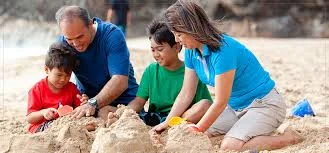The corona virus pandemic has been awful. Families and kids have suffered greatly. For the most part I can’t wait for things to be more positive and certain. That being said, there have been some silver linings for families, and it is my hope that parents are very mindful about deliberately working to keep those advantages in place.
Read MoreThe fact that your child has been diagnosed with ADHD may bring up a lot of emotions—fear, sadness, guilt, anger, confusion. But to my mind the diagnosis is good. Let me tell you why. You have been living with a child with ADHD for quite some time now. Whether or not you knew it, you knew your child is different. To my mind, having a diagnosis is a good thing: It means you can get the professional help your child might really need. In the meanwhile, all the parenting techniques that support harmony and cooperation in any household are even more important with your kids with an ADHD diagnosis.
Read MoreThe tagline to my business Joyful Parenting Coaching is Be the Architect of Your Family. With that, I really mean to parent deliberately. Here are three reasons I see structure as supporting a happy, harmonious family life: It makes kids feel secure; it gives opportunities for independence; and it can improve connection among family members.
Read MoreThree months into COVID-19, we are more antsy and our nerves are more frayed. It is no surprise that our kids’ behavior might be amping up. You should expect to see more moodiness and more negative interactions as they lose the structure remote learning (such as it was) provided. The best way to counteract that is CONNECTION. In a world that is feeling slightly crazy, it is even more important that kids feel anchored to the family. The forced physical proximity of being home together helps, but kids too often withdraw into their rooms and onto their screens. Get them off their phones and to the table for family dinner!
Read MorePutting the fear of god into your children doesn’t work; neither does giving in to their every whim. True cooperation from kids is based on relationship and connection. The question is how do you build the closeness and mutual trust in the midst of running through the day and getting everyone else’s needs met? The closest thing to a silver bullet is Special Time (and, yes, that’s capital S and capital T!).
Read MoreEffective Parenting pillars: Clarity, Connection and Consistency. Master these three parenting pillars and all the other parenting challenges will be easier as you will have the strong bond that you need to get your kids’ cooperation.
Read MoreAs parents approach the teen years, they get fearful about all the pitfalls their sweet baby can fall into. Yes, it is scary. Between social media and new addictions like vaping, there is a lot that can pull a kid off track. There is no silver bullet for protecting our kids. Even companies like Apple that are trying to provide parental controls on their devices are failing to truly protect our kids. So what does buffer our kids? Well in studies of measures that support kids in thriving, a strong connection to family remains one of the best tools.
Get 4 Tips for Building a Healthy Relationship with Your Kids
Read MoreDo I ever recommend to a client that they see a therapist? Yes! As a parenting coach, I am focused on getting parents the skills they need to run their homes more harmoniously and to have closer, more connected relationships with their kids. Sometimes a person’s mental health keeps a parent from fully focusing on their kids, and it can be hard to make the progress they need to transform their families. That’s a great time to see a therapist.
Read MoreWe get thrown as parents when our kids ask (demand!) something that they know we are going to say no to. Have we ever said yes to a popsicle for breakfast? No! So why would they even think to ask? Read to find out .
Read MoreShould You Make Your Kid Apologize?
That’s a tricky question! There is no doubt that our children need to understand the idea of an apology but given that there are different kinds of apologies for different situations, teaching our children to offer an apology is not a straight forward task. It certainly won’t be taught with a simple rule. Or with a single iteration. Let’s consider the nature of apologies and where our own practice lines up with our expectations of our children.
Read MoreIs it potato chips and soda making kids obese? Maybe not! While a healthy diet is important, of course, new research by Dr. Asheley Cockerel Skinner of the University of North Carolina (Chapel Hill) finds that “it is becoming increasingly obvious that the lack of physical exercise in children is the main culprit in the startling rise of childhood obesity, heart disease, diabetes, and all other types of preventable medical conditions.”
If you are sick of nagging and arguing about it, here are some sneaky ways to assure your kids move their bodies without focusing on it being “exercise.”
Read MoreAt the end of the day, family is about being together and feeling like a connected unit. With very little time in the week left over for parenting and family time, it is essential to be deliberate about the choices you make for your family--both by protecting the time you do have together and by making sure that time is quality time. Here are some tips on how to do that.
Read MoreA client called frustrated because she had offered her 7th grader a bribe to do something she really wanted him to do that he was digging his heels in on, and now he was demanding that she give him something every time she asked him to do anything at all. That's a problem!
Read MoreThere are many reasons to give kids chores (To see a comprehensive list, go HERE. Kids like to feel needed and capable. Chores help with both. When parents set up chores as “In our family we help each other,” kids see their work as being an important part of being a member of the family. Plus, kids like knowing they are able to do things on their own. They like being able to know that they were the one who made the living room sparkle or who saw to it that every family member had a sandwich ready to take in his lunch. When all the family members are contributing, it frees up time for family fun, and parents are less stressed. Parents have to get themselves ready for work. If the kids are making lunch for everyone while Mom and Dad are getting breakfast on the table, families end up having a few minutes to sit down and start the day together.
Read MoreSeparation anxiety is a normal stage for kids to go through. It starts around 6 months and usually tapers off around 2 years old. During these months a baby is first gaining the cognitive recognition that you still exist when you are not there, which means baby can now miss you when you are not there. The problem often intensifies because at the same time baby realizes that her primary source of food and comfort can leave her, she is also testing the ways in which she is an individual. That's scary! A lot of separation anxiety is about finding that fine line between growing more independent and at some level still knowing she is fully dependent on you for survival.
Read MoreTantrums are a natural stage in every child's development. While some parents with easy going children may have fewer of them to deal with, no parent avoids tantrums altogether. However, there are steps we can take to avoid and/or mitigate tantrums.
Read More
















